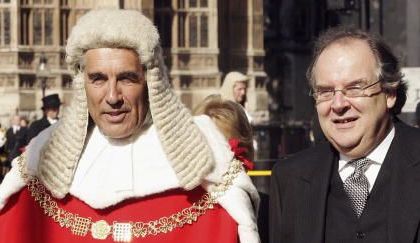
By Majed Iqbal- What was sparked off as a major discussion in February this year by Archbishop Rowan Williams on Shariah law has once again re-surfaced in the Media. However, this time its not a religious figure who will be maligned by the nation for promoting values of Islam instead of his own faith.
Joining the discussion this time round is Lord Chief Justice, Lord Phillips of Worth Matravers who has said "There is no reason why sharia principles, or any other religious code, should not be the basis for mediation or other forms of alternative dispute resolution".
The judge said the Archbishop of Canterbury, Dr Rowan Williams, had been misunderstood when it was reported in February that he said British Muslims could be governed by sharia law. "Dr Williams suggested that sharia could play a role in aspects of marital law, the regulation of financial transactions and authorised structures of mediation and conflict resolution. It was not very radical to advocate embracing sharia law in the context of family disputes" he said.
Whilst one would warm to the comments made by the Chief Justice in appreciating how Shariah has the ability to resolve disputes in a manner in personal lives in a decent and befitting manner, much to the contrary of what is seen in wider society, his understanding of how shariah deals with crime and punishment in societal life seems to be marred with the same images of 'Kangaroo courts' displayed in Tabloid press and documentaries that have hit our screens.
The Lord Chief Justice was quick to add that severe physical punishments such as flogging, stoning and the cutting off of hands would not be acceptable. He added: "There can be no question of such courts sitting in this country, or such sanctions being applied here".
Whilst no person or group calls for shariah in the Societal domain to be applied here in Britain, it is surprising to see that the Chief Justice was not as fast to praise the Hudood (punishments) as he did with tahkim (Arbitration in marriages). It seems that some aspects of shariah are palatable to moral codes which some people would would applaud whilst the societal laws of Islam are presented as outdated and bankrupt in solving 'real' and modern issues like online internet Fraud, Youth Crime, Drug trafficking, White collar crime, Financial mis-management of Politicians in expenses, Religious and raical hate crimes, taking the ruler to task for illegal wars or domestic violence.
The Lord Chief Justice stated that severe physical punishments such as flogging, stoning and the cutting off of hands would not be acceptable. He added: "There can be no question of such courts sitting in this country, or such sanctions being applied here"
Such comments illustrate a clear misunderstanding of the Islamic System whose track record stands in the books of History as unprecendented in dealing with progress of societies.
As Richard W. Bulliet, notes in his 2004 book "The Case for Islamo-Christian Civilization". The Islamic system has been maligned in the west for generations, even though it provided an impartial and considered judgement on matters presented to the court. To quote from his book, he states:
"The twentieth-century sociologist Max Weber, extrapolating perhaps from received European opinions about oriental despots, coined the term "qadi justice" (referring to the judge presiding over a Muslim court) to describe the utmost in arbitrariness of judicial procedure.
However, scholars who have gained access to the judicial court records of the Ottoman Empire, unavailable in Weber's day, have thoroughly and repeatedly refuted this stereotype. Minutely studying case after case, they have shown that justice was generally meted out impartially, irrespective of religion, official status, gender, or ethnicity."
In fact, Islam under the Khilafah System (islamic caliphate) was re-knowned for its principles which exemplified justice,respect for law, equlaity, and the rule of law.
As Marcel Boisard states in his journal article: BOISARD, MARCEL A. (JULY 1980), "ON THE PROBABLE INFLUENCE OF ISLAM ON WESTERN PUBLIC AND INTERNATIONAL LAW", INTERNATIONAL JOURNAL OF MIDDLE EAST STUDIES quotes
"It was above all the very high ethical standard of Islamic law that impressed the medieval West and provoked the development of a more refined legal thinking. This aspect is undoubtedly the most durable merit of Muslim influence, as illustrated by the administration of justice. Until the Crusades, legal procedure in the West consisted of "God's judgments" by boiling water or by duel, or by "ordeal" during which people were burnt with red-hot irons or boiling oil and, if they survived, declared "not guilty." In contrast, we have only to quote the instructions given by Omar in the seventh century to the Muslim judges to show what a chasm separated the two conceptions: "Only decide on the basis of proof, be kind to the weak so that they can express themselves freely and without fear, deal on an equal footing with litigants by trying to reconcile them."
Indeed it is this justice whose call is once again resonating in the Muslim world to be applied again. Unfortunately, the Lord Chief Justice, Lord Phillips of Worth Matravers may not see this as befitting as his conception of Shariah, state and law is blinded by secular principles.
Hitlers in disguise. It should be for the people including the non-religious in this country who do not want to kill anyone that disagrees with them, to have a referendum on these matters not leave them to out of touch judges and archbishops.
ReplyDeleteHuman Rights should be on top of the agenda, ='do to others as you would want done to yourself.'